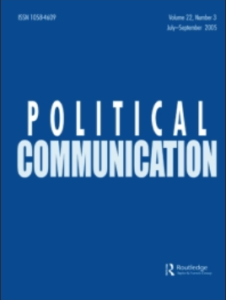Political Communication
 Political Communication is the official journal of the APSA Political Communication Section and the ICA Political Communication Division, published by Taylor & Francis.
Political Communication is the official journal of the APSA Political Communication Section and the ICA Political Communication Division, published by Taylor & Francis.
It is an international journal, published quarterly, that features cutting-edge theory-driven empirical research at the intersection of politics and communication. Its expansive subject is the site of rapid changes and pressing policy concerns worldwide. The journal welcomes all research methods and analytical viewpoints that advance understanding of the practices, processes, content, effects, and policy implications of political communication. Regular symposium issues explore key issues in depth.
You can find the journal’s website here.
Editor
Regina Lawrence – University of Oregon
Founding Editor
Doris A. Graber – University of Illinois at Chicago, USA
Associate Editors
Kevin Arceneaux – Temple University, USA
Johanna Dunaway – Texas A&M, USA
Frank Esser – University of Zurich, Switzerland
Daniel Kreiss – University of North Carolina, USA
Eike Mark Rinke – University of Leeds, UK
Kjerstin Thorson – Michigan State University, USA
Forum Editor
Mike Wagner – University of Wisconsin–Madison, USA
